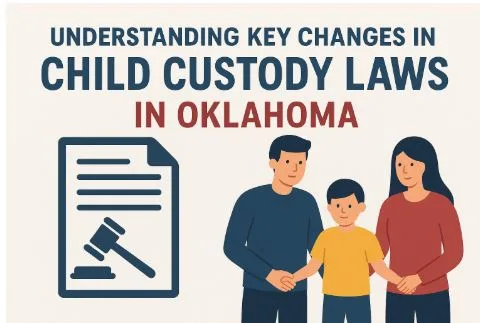Understanding Key Changes in Child Custody Laws in Oklahoma
Navigating the child custody process in Oklahoma can feel overwhelming, especially for parents who are already facing the emotional challenges of separation or divorce. With recent legal updates, understanding how custody decisions are made and what factors courts consider is more important than ever. This article breaks down the essentials, highlights the key changes in child custody laws in Oklahoma, and helps parents better prepare for what to expect.
What Is Child Custody in Oklahoma?
Child custody refers to the legal and physical responsibility a parent has for their child. In Oklahoma, custody is divided into two categories:
- Legal custody: The authority to make major decisions for the child, such as those involving education, healthcare, and religious upbringing.
- Physical custody: Where the child lives and the day-to-day care provided.
Courts may grant custody solely to one parent or jointly to both parents, depending on what is determined to be in the best interest of the child.
Recent Shifts in Custody Laws
Like many states, Oklahoma’s custody laws evolve to reflect changes in family dynamics, social values, and child welfare research. Some of the most important recent changes include:
1. Greater Emphasis on Shared Parenting
Courts now lean more toward shared custody arrangements when possible. Research showing the benefits of children maintaining strong relationships with both parents has influenced this shift. Unless there are concerns about safety or well-being, shared custody is often seen as the best outcome.
2. Stronger Focus on Child’s Best Interests
While the “best interests of the child” standard is not new, Oklahoma courts now give deeper consideration to factors such as:
- The child’s relationship with each parent
- The ability of each parent to provide stability
- The child’s adjustment to school and community
- Any history of abuse, neglect, or substance misuse
3. Custody Modifications Made Easier in Certain Cases
Parents can now request modifications to custody orders more easily if there are significant changes in circumstances, such as relocation, job changes, or new concerns about safety. This gives families flexibility to adapt to life’s changes while keeping the child’s well-being front and center.
How Custody Decisions Are Made
Courts in Oklahoma consider multiple factors when awarding custody. Some of the most common include:
- Parental cooperation: Judges want to see that parents can communicate and work together for the child’s benefit.
- Living arrangements: The stability and suitability of each parent’s home environment matter.
- Child’s wishes: If a child is old enough and mature enough, their preferences may be taken into account.
- Parental involvement: Courts assess how involved each parent has been in the child’s daily life, education, and activities.
Parenting Plans and Their Importance
One major update in recent years is the increasing importance of parenting plans. Parents are encouraged, and sometimes required, to submit a detailed plan outlining:
- Custody schedules
- Decision-making responsibilities
- How disputes will be resolved
When parents agree on a plan, courts are more likely to approve it, saving time and reducing conflict.
The Role of Mediation in Custody Cases
Mediation has become a more common step in child custody disputes. Instead of immediately going to court, parents may be required to attend mediation sessions to reach an agreement. This process often helps reduce stress and can lead to more cooperative long-term arrangements for the child.
Enforcement of Custody Orders
Once a custody order is issued, both parents must follow it. Oklahoma courts take enforcement seriously. If one parent violates the order such as withholding visitation or failing to meet responsibilities, the other parent can file a motion for enforcement. Judges may impose penalties, adjust custody, or even hold the violating parent in contempt.
Preparing for Custody Proceedings
Custody proceedings can be stressful, but preparation helps. Parents should:
- Keep records of involvement in the child’s life (school activities, healthcare visits, etc.).
- Maintain respectful communication with the other parent.
- Demonstrate consistency and stability at home.
Courts tend to favor parents who can show they are prioritizing the child’s best interests over personal conflict.
Why Staying Informed Matters
Family law is constantly evolving, and staying updated is critical for parents navigating custody disputes. Understanding the latest child custody laws in Oklahoma ensures that parents are better prepared for court hearings, mediation sessions, and long-term parenting responsibilities.
For those facing custody issues, learning the law and understanding how it applies can make the process less intimidating and more manageable.
Conclusion
Child custody cases are never easy, but Oklahoma’s legal system continues to shift toward prioritizing children’s needs while encouraging parents to share responsibilities whenever possible. With greater emphasis on shared parenting, the importance of parenting plans, and easier modification processes, families can better adapt to changing circumstances.
Parents who take time to understand the child custody laws in Oklahoma are better equipped to make informed decisions that protect their child’s well-being and ensure a stable future.




